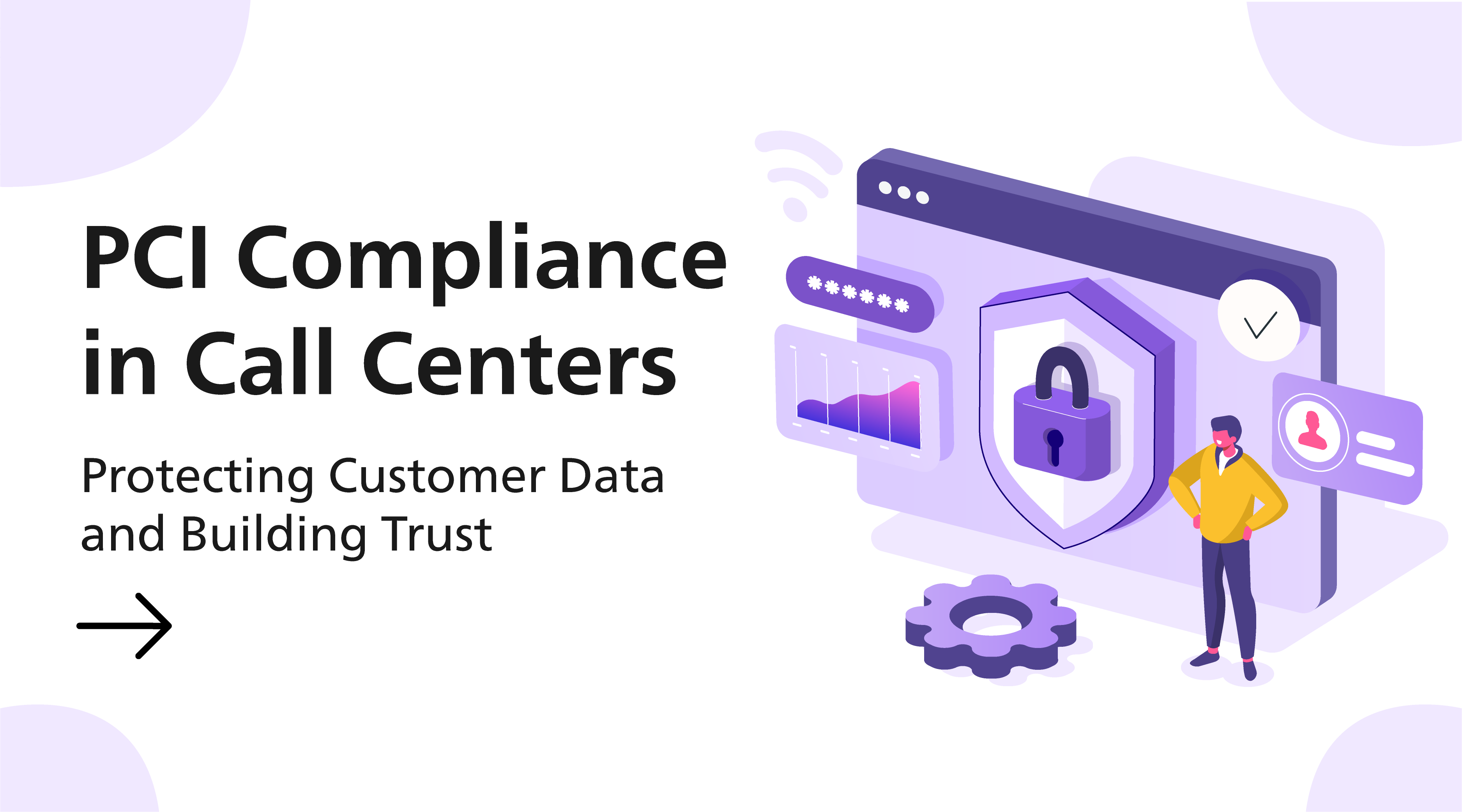9 Key Strategies for Keeping Top Talent in Your Contact Center
by Nicole Robinson | Published On March 6, 2024 | Last Updated January 27, 2025

Agent retention is the cornerstone of successful contact centers. The caliber of customer interactions directly influences business outcomes, making it essential to prioritize employee retention.
What is Agent Retention?
Agent retention, or employee retention, measures an organization’s ability to keep its workforce over a given period. For instance, a retention rate of 80% indicates that the company retains 80% of its employees during a specific timeframe.
How to calculate the retention rate
To calculate the retention rate, use the following formula:

Why Agent Retention Is Crucial for Contact Centers
High agent retention is vital for contact centers because skilled and experienced agents directly impact customer satisfaction and operational efficiency. Retaining talented employees leads to:
1. Superior Customer Service
Experienced agents are better equipped to handle complex customer interactions with confidence and efficiency. Their familiarity with processes, tools, and customer needs allows them to resolve issues faster and provide more personalized, empathetic service. This not only leads to higher customer satisfaction scores (CSAT) but also fosters long-term customer loyalty, which directly impacts revenue growth.
2. Improved Agent Engagement
When agents feel valued and supported in their roles, they are more motivated to perform at their best. Engaged agents are more likely to go the extra mile to assist customers, contributing to a cycle of excellent service. This positive energy enhances the workplace environment, encouraging collaboration, innovation, and peer motivation.
3. Reduced Costs
Retaining skilled employees significantly reduces the costs associated with high turnover. Recruiting, onboarding, and training new agents are time-consuming and expensive processes. Moreover, new agents often require months to reach the productivity levels of their seasoned counterparts. By prioritizing retention, contact centers can save money and maintain a steady level of operational efficiency.
4. Consistency in Service Delivery
Low turnover ensures a more stable team with a consistent approach to service delivery. Customers benefit from interactions with knowledgeable agents who understand the organization’s products, services, and culture. This consistency builds trust and enhances the customer experience, especially in industries where repeat interactions are common.
5. Stronger Brand Reputation
High agent retention reflects a positive workplace culture, which in turn strengthens the organization’s reputation as an employer of choice. Happy employees are more likely to advocate for the company and share positive experiences, which can attract top talent and boost the brand’s image among customers.
9 Proven Strategies to Retain Contact Center Agents
Retaining top talent in contact centers is a multifaceted challenge that requires a proactive approach to employee well-being, career development, and workplace culture. Below are 9 detailed strategies to foster loyalty among agents and reduce turnover.
- Promote Work-Life Balance
- Invest in Employee Development
- Enhance Communication
- Recognize and Reward
- Foster a Positive Culture
- Offer Competitive Compensation Packages
- Ensure Onboarding Excellence
- Create an Engaging Work Environment
- Conduct Exit Interviews for Continuous Improvement
1. Promote Work-Life Balance
Work-life balance is a key factor in retaining contact center agents, especially in high-pressure environments where burnout is common. Employees are more likely to stay in roles that allow them to balance professional obligations with personal priorities.
Key Benefit:
Flexible work arrangements improve agent productivity, reduce burnout, and enhance loyalty, making your organization a more attractive employer in the contact center industry.
How to Promote Work-Life Balance:
- Flexible Schedules: Allow agents to choose their shifts or swap shifts easily via workforce management (WFM) tools.
- Remote and Hybrid Work Options: Provide agents the option to work from home or adopt a hybrid model, especially for roles that do not require physical presence.
- Wellness Programs: Incorporate initiatives like mindfulness training, fitness challenges, and access to mental health resources to support overall well-being.
Example:
A contact center adopted a hybrid work model where agents worked three days in the office and two days remotely each week. This approach provided the flexibility of working from home while maintaining in-person collaboration opportunities.
Read: 6 Ways to Support Your Contact Center Employees Working from Home
2. Invest in Employee Development
Ongoing learning opportunities are essential to keeping agents engaged and motivated. Employees want to grow their skills and advance their careers, making training and development a critical strategy for retention.
Key Benefit:
Regular skill development opportunities make employees feel empowered, boosting loyalty and reducing attrition rates.
How to Support Professional Development:
- Ongoing Training: Offer workshops, e-learning modules, and mentorship programs to keep agents up-to-date on industry trends and best practices.
- Career Pathways: Clearly outline growth opportunities, such as promotions to supervisory roles or lateral moves to specialized departments.
- Cross-Training: Encourage agents to learn new skills, such as handling different communication channels (e.g., chatbots or social media), to enhance versatility and engagement.
Example:
Companies like Amazon provide extensive training programs, such as the Amazon Technical Academy, to upskill employees and prepare them for leadership positions, fostering long-term loyalty.
Read: Everything You Need to Know About Call Center Training
3. Enhance Communication
Communication is the cornerstone of agent engagement. When agents feel heard and valued, they are more likely to remain committed to the organization.
Key Benefit:
Open communication fosters trust, strengthens relationships, and creates a culture of inclusion that supports long-term retention.
How to Improve Communication:
- Regular Check-Ins: Conduct weekly one-on-one meetings to discuss performance, challenges, and career aspirations.
- Employee Feedback Channels: Use surveys, suggestion boxes, or town hall meetings to gather input and demonstrate that employee voices matter.
- Transparent Policies: Clearly communicate expectations, performance metrics, and opportunities for growth to build trust.
Example:
A contact center introduced a monthly “Agent Roundtable,” where agents could share feedback directly with senior leadership.
4. Recognize and Reward
Recognition is one of the most powerful motivators for contact center agents. Employees who feel appreciated for their contributions are more likely to remain loyal to the organization.
Key Benefit:
Recognition not only boosts morale but also drives performance, making agents feel valued and motivated to contribute long-term.
How to Recognize and Reward Agents:
- Recognition Programs: Implement programs like “Agent of the Month” or “Top Performer of the Week” to celebrate achievements.
- Tangible Rewards: Offer bonuses, gift cards, or additional paid time off as rewards for exceptional performance.
- Personalized Appreciation: Tailor recognition efforts to individual preferences, such as a handwritten note, a team announcement, or a personalized gift.
Example:
A contact center implemented an “Agent of the Month” program to recognize top performers, rewarding each recipient with a gift card as a token of appreciation.
Read: Top 5 ways to show appreciation to your agents
5. Foster a Positive Work Culture
A supportive and inclusive workplace culture is crucial for agent retention. When employees feel a sense of belonging and alignment with company values, they are more likely to remain loyal.
Key Benefit:
A positive workplace culture builds loyalty, improves morale, and ensures agents feel connected to the organization’s mission.
How to Build a Positive Culture:
- Inclusivity Initiatives: Celebrate diversity and create an environment where everyone feels welcome. This can include cultural awareness days, diversity training, and inclusive hiring practices.
- Collaboration Opportunities: Encourage teamwork through group projects, team-building activities, and open-door management policies.
- Employee Well-Being: Create a culture that prioritizes physical and mental health by promoting work-life balance and offering resources like counseling services.
Example:
A contact center launched an “Employee Appreciation Week” with events like team lunches, wellness workshops, and leadership Q&A sessions.
6. Offer Competitive Compensation Packages
Competitive compensation is a fundamental driver of agent retention. Providing attractive salaries and benefits ensures that employees feel their efforts are valued and reduces the likelihood of them seeking opportunities elsewhere.
Key Benefit:
Fair and competitive compensation motivates agents, increases job satisfaction, and attracts top talent in a competitive labor market.
How to Offer Competitive Compensation:
- Market Benchmarking: Regularly analyze industry salary trends to ensure your pay structure is competitive.
- Performance Bonuses: Reward agents who meet or exceed KPIs with bonuses or incentives tied to their achievements.
- Comprehensive Benefits: Provide health insurance, retirement plans, and wellness perks like gym memberships or childcare support.
Example:
A contact center revamped its compensation structure to include quarterly bonuses and additional paid time off for top-performing agents.
7. Ensure Onboarding Excellence
A robust onboarding process is crucial for making new hires feel welcome and prepared to excel in their roles. Effective onboarding can significantly reduce early attrition and set agents up for long-term success.
Key Benefit:
A strong onboarding experience builds trust and confidence in new hires, improving retention during the critical first few months of employment.
Steps for Onboarding Excellence:
- Comprehensive Training: Equip new agents with the skills and knowledge they need to handle customer interactions confidently.
- Mentorship Programs: Pair new hires with experienced agents to provide guidance and foster connections within the team.
- Early Feedback Mechanisms: Conduct frequent check-ins during the first 90 days to address challenges and gauge satisfaction.
Example:
A contact center introduced a 60-day onboarding program that included interactive training, role-playing exercises, and one-on-one mentorship.
8. Create an Engaging Work Environment
Engagement plays a vital role in retaining agents. A dynamic and stimulating work environment can make routine tasks more enjoyable and motivate employees to stay committed to their roles.
Key Benefit:
An engaging work environment increases motivation, reduces monotony, and makes agents more invested in their roles.
How to Build Engagement:
- Gamification: Turn mundane tasks into competitive games with leaderboards, rewards, and recognition for top performers.
- Technology Integration: Leverage advanced tools like AI and automation to simplify repetitive tasks, allowing agents to focus on higher-value interactions.
- Team Collaboration: Organize team-building activities, brainstorming sessions, or virtual hangouts to foster camaraderie.
Example:
A contact center implemented a gamification platform where agents earned points for meeting KPIs, such as resolving calls quickly and achieving high customer satisfaction scores. These points could be redeemed for rewards such as a gift card.
9. Conduct Exit Interviews for Continuous Improvement
Understanding why employees leave is a valuable step toward improving retention. Exit interviews provide critical insights into the challenges and gaps within your organization, enabling proactive measures to address these issues.
Key Benefit:
Exit interviews provide actionable feedback to identify and address retention challenges, ultimately creating a better workplace for current and future employees.
How to Leverage Exit Interviews:
- Standardized Questions: Develop a consistent set of questions to uncover recurring themes and pain points.
- Analyze Trends: Review feedback from multiple exit interviews to identify systemic issues, such as workload concerns or lack of career growth opportunities.
- Take Action: Use the insights to implement meaningful changes, such as policy updates or targeted training programs.
Example:
A contact center found through exit interviews that many agents left due to a lack of advancement opportunities. In response, the company created a leadership development program.
Building a Workforce for Lasting Success
Retaining top talent in contact centers is no longer just a strategic advantage—it’s an operational necessity in today’s competitive landscape. By implementing proven strategies such as promoting work-life balance, fostering a positive culture, and investing in agent development, contact centers can create an environment where employees feel valued, engaged, and motivated to excel. Adding initiatives like competitive compensation, onboarding excellence, and leveraging feedback from exit interviews further strengthens retention efforts.
Ultimately, employee satisfaction directly impacts customer satisfaction and organizational success. A committed and skilled workforce enhances service quality, boosts efficiency, and drives business growth. By prioritizing agent retention and creating a supportive, innovative workplace, contact centers can position themselves as employers of choice and achieve sustained success in an evolving industry.
Want to learn how to prevent burnout and improve agent retention? Read our guide: Call Center Burnout: A Complete Guide
More from our blog
 Today’s customers expect faster, more efficient, and more convenient experiences when they contact businesses, but they’re not willing to compromise on the security of their data. That’s why it’s so important for organizations to ensure they’re investing in the right...
Today’s customers expect faster, more efficient, and more convenient experiences when they contact businesses, but they’re not willing to compromise on the security of their data. That’s why it’s so important for organizations to ensure they’re investing in the right...
 Ready to transform customer experience in 2025? Discover the top customer service trends shaping today’s landscape, from agentic AI and hyper-personalization to employee experience.
Ready to transform customer experience in 2025? Discover the top customer service trends shaping today’s landscape, from agentic AI and hyper-personalization to employee experience.
 Call center optimization is a crucial process of leveraging cutting-edge technologies and processes to enhance the customer experience and improve the efficiency of your contact center.
Call center optimization is a crucial process of leveraging cutting-edge technologies and processes to enhance the customer experience and improve the efficiency of your contact center.

